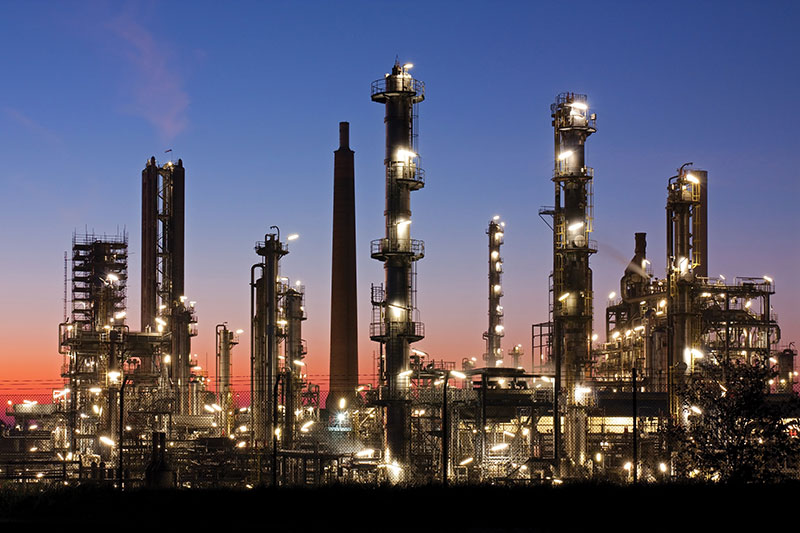Germany's $55 Billion Gas Deal with Norway Ends Russian Dependency
(Reuters) — Germany's decision to make Norway its biggest gas supplier, culminating in a deal this week that will cover a major chunk of its industrial needs, means it has replaced the formerly dominant Russia with another equally dominant supplier.
The risk of deliberate supply disruption of gas from a friendly country may be much lower, but Germany could find itself at the mercy of technical issues, analysts say.
Since supply disruptions linked to Russia's invasion of Ukraine, Germany, Europe's largest economy, has substituted huge volumes of Russian gas through deals with Norway, Europe's biggest gas producer. It has also agreed supply deals with liquefied natural gas (LNG) traders.
On Tuesday, German state-owned energy firm Sefe and Norway's Equinor announced a 50 billion euro ($55 billion) gas deal that will provide a third of the industrial gas Germany needs.
The deal consolidates Norway's position as Germany's main supplier that it has held since Gazprom suspended direct deliveries via the Nord Stream pipeline from Russia to Germany in 2022.
It will take Norway's share of Germany's gas supplies to around 60%, comparable with the amount Russia used to account for.
Tobias Federico, analyst at Berlin-based consultancy Energy Brainpool, said politically stable countries such as Norway still carried "a risk of renewed dependence".
"Germany should learn from the mistakes of the past," he said, saying LNG could increase diversification.
Philipp Steinberg, head of the economic stabilisation and energy security unit in Germany's Economy Ministry, has also said the country was at risk from over-reliance.
"Our dependence on Norway is too great," he wrote on X, formerly known as Twitter, last month. "The crisis has taught us that we must diversify."
Eurasia Group analyst Henning Gloystein said shared political ideas reduced disruption risks, but could not prevent technical problems linked to the scale of the pipeline network between Norway and Germany.
Gloystein said some protection derived from the number of pipelines as if one shut, gas could be rerouted.
However, the difficulty of protecting pipelines that run over great distances was underlined by unexplained attacks on the Nord Stream pipeline on which Germany used to depend.
Even without sabotage, maintenance led to production outages in Norway earlier this year that drove up prices and, according to LSEG data, caused piped flows from the country to European customers to fall to their lowest in at least a decade.
LNG Has Risks Too
Although LNG offers diversification, Germany has historically favored pipeline gas because long-term contracts can make it cheaper than LNG, which is subject to market volatility and shipping problems related to war, for instance.
LNG is also relatively energy intensive as it has to be supercooled to be transported and then regasified when it reaches its destination, adding to its carbon footprint.
Germany has signed long-term LNG supply deals with U.S. producers ConocoPhillips and Venture Global LNG and commissioned gas import terminals.
But, together with Norway, it has sought to shift towards cleaner energy in the future.
It has also reduced consumption, which climate campaigners say is among the best responses to the energy challenge.
Average monthly gas imports are down more than a quarter in 2023 compared with last year, when Russia still delivered for some months, albeit at reduced levels, data from Germany's statistics office show.
But German industry remains heavily dependent on gas as both a feedstock and an energy source.
Whatever the downsides of Norwegian dependence, a German government reeling from the economic impact of Russian gas disruption and high interest rates can find relief in this week's Norwegian contract.
Sefe, meanwhile promises to help the energy transition, as its deal with Equinor covers the replacement of natural gas with potential deliveries of hydrogen from 2029.
Related News
Related News

- Keystone Oil Pipeline Resumes Operations After Temporary Shutdown
- Freeport LNG Plant Runs Near Zero Consumption for Fifth Day
- Biden Administration Buys Oil for Emergency Reserve Above Target Price
- Mexico Seizes Air Liquide's Hydrogen Plant at Pemex Refinery
- Enbridge to Invest $500 Million in Pipeline Assets, Including Expansion of 850-Mile Gray Oak Pipeline





Comments